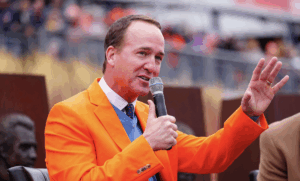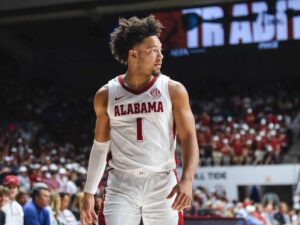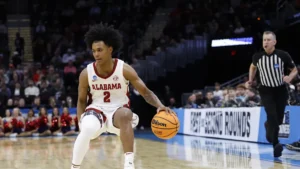
Unprecedented Rejection: Alabama Crimson Tide QB Keelon Rusell rejects a massive $6.5 million NIL offer from USC, prioritizing team loyalty over financial gain
In a landscape where college athletes are increasingly leveraging Name, Image, and Likeness (NIL) deals to secure financial futures, Keelon Russell’s decision to reject a substantial $6.5 million NIL offer from the University of Southern California (USC) has sent ripples through the college football community. This unprecedented move underscores a shift in priorities among elite athletes, highlighting the enduring value of team loyalty, personal development, and long-term career aspirations over immediate financial gain.
Keelon Russell, a dual-threat quarterback from Duncanville, Texas, has been a standout figure in high school football. As the Gatorade National Football Player of the Year, Russell amassed over 4,100 passing yards and 55 touchdowns in his junior season, leading Duncanville High School to a 13-1 record . His exceptional performance earned him a five-star rating and the No. 2 quarterback spot in the 2025 recruiting class .
Initially committed to Southern Methodist University (SMU), Russell flipped his commitment to the University of Alabama in June 2024. His decision was influenced by the relationships he developed with Alabama’s coaching staff and the program’s history of developing quarterbacks .
As Russell’s high school career concluded, USC, among other programs, extended lucrative NIL offers to entice him to reconsider his commitment. Reports indicate that USC presented a $6.5 million NIL deal, positioning it as one of the most substantial offers in recent college football history. Such offers are becoming increasingly common as programs seek to capitalize on the financial opportunities presented by NIL legislation.
Despite the allure of immediate financial gain, Russell chose to honor his commitment to Alabama. He emphasized that his decision was rooted in long-term goals rather than short-term rewards. “If I do my thing, it’s going to come regardless,” Russell stated, highlighting his belief that sustained success would lead to greater opportunities in the future .
Russell also expressed his appreciation for Alabama’s unwavering support, noting that the program recognized his potential even during challenging moments. “Alabama came to one of my worst practices as a quarterback. I was off that day. And for them to still give me a chance to be their quarterback and saw something in me, I was like, ‘Man, this is crazy,'” he remarked .
Russell’s decision is emblematic of a broader trend where elite athletes prioritize personal development, team dynamics, and long-term career prospects over immediate financial incentives. In an era where NIL deals can overshadow traditional recruitment factors, Russell’s choice underscores the enduring importance of program culture, coaching quality, and developmental opportunities.
While Alabama may not have matched USC’s $6.5 million offer, the program provides its athletes with competitive NIL opportunities. Russell has already secured an exclusive multi-year autograph trading card deal with Panini America, marking his first NIL agreement before even stepping onto the field for Alabama . Additionally, Alabama’s “Yea Alabama” NIL program offers a structured platform for athletes to maximize their earning potential while focusing on their athletic and academic commitments .
As Russell prepares to join the Alabama Crimson Tide, his decision to prioritize loyalty and long-term goals over immediate financial gain positions him as a role model for aspiring athletes. His story serves as a reminder that success in college football is not solely measured by financial rewards but by personal growth, team contributions, and the pursuit of excellence on and off the field.
Keelon Russell’s rejection of USC’s $6.5 million NIL offer is a testament to the evolving values within college athletics. In a time when financial incentives often dominate headlines, Russell’s commitment to Alabama reflects a deeper understanding of the importance of loyalty, personal development, and long-term success. As he embarks on his collegiate career, Russell’s decision will undoubtedly inspire future generations of athletes to consider the broader implications of their choices and the enduring value of staying true to one’s commitments.





